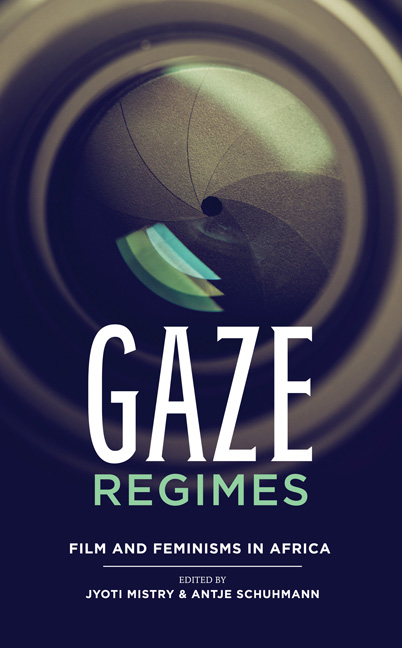Book contents
- Frontmatter
- Contents
- Acknowledgements
- Foreword: Goethe-Institut sub-Saharan Africa
- Introduction: By way of context and content
- 1 African Women in Cinema: An overview
- 2 ‘I am a feminist only in secret’
- 3 Staged Authenticity: Femininity in photography and film
- 4 ‘Power is in your own hands’: Why Jihan El-Tahri does not like movements
- 5 Aftermath – A focus on collective trauma
- 6 Shooting Violence and Trauma: Traversing visual and social topographies in Zanele Muholi's work
- 7 Puk Nini – A Filmic Instruction in Seduction: Exploring class and sexuality in gender relations
- 8 I am Saartjie Baartman
- 9 Filmmaking at the Margins of a Community: On co-producing Elelwani
- 10 On Collective Practice and Collected Reflections
- 11 ‘Cinema of resistance’
- 12 Dark and Personal
- 13 ‘Change? This might mean to shove a few men out’
- 14 Barakat! means Enough!
- 15 ‘Women, use the gaze to change reality’
- 16 Post-colonial Film Collaboration and Festival Politics
- 17 Tsitsi Dangarembga: A manifesto
- Acronyms and Abbreviations
- List of Contributors
- Filmography
- Index
15 - ‘Women, use the gaze to change reality’
Published online by Cambridge University Press: 20 April 2018
- Frontmatter
- Contents
- Acknowledgements
- Foreword: Goethe-Institut sub-Saharan Africa
- Introduction: By way of context and content
- 1 African Women in Cinema: An overview
- 2 ‘I am a feminist only in secret’
- 3 Staged Authenticity: Femininity in photography and film
- 4 ‘Power is in your own hands’: Why Jihan El-Tahri does not like movements
- 5 Aftermath – A focus on collective trauma
- 6 Shooting Violence and Trauma: Traversing visual and social topographies in Zanele Muholi's work
- 7 Puk Nini – A Filmic Instruction in Seduction: Exploring class and sexuality in gender relations
- 8 I am Saartjie Baartman
- 9 Filmmaking at the Margins of a Community: On co-producing Elelwani
- 10 On Collective Practice and Collected Reflections
- 11 ‘Cinema of resistance’
- 12 Dark and Personal
- 13 ‘Change? This might mean to shove a few men out’
- 14 Barakat! means Enough!
- 15 ‘Women, use the gaze to change reality’
- 16 Post-colonial Film Collaboration and Festival Politics
- 17 Tsitsi Dangarembga: A manifesto
- Acronyms and Abbreviations
- List of Contributors
- Filmography
- Index
Summary
Katarina Hedren is a film programmer and festival organiser, as well as a discussion and workshop moderator/facilitator, and a writer, translator -and interpreter in different contexts related to the cultural industries. She has worked with various producers, organisations and film festivals such as Women of the Sun, an advocacy organisation for African woman filmmakers, the Tri-Continental Human Rights Film Festival and the international documentary conference, People to People. She is one of two co-programmers for the First Wednesday Film Club, an independent Johannesburg-based film club which has become an institution among film- and TV-industry professionals and film enthusiasts. Her writing has appeared in Swedish, South African and pan-African publications and websites, including the Swedish film publication FLM, the Stockholm International Film Festival's catalogue, The Times, Africa is a Country and Africine. Katarina is the author of the blog ‘In the Words of Katarina’. Before moving to South Africa from Sweden she was a board member and the chairperson of the Swedish-African film festival CinemAfrica between 2001 and 2005. In addition to offering Swedish cinemagoers otherwise hard-to-access quality films made by African filmmakers from Africa and its diasporas, CinemAfrica's goal is to spread nuanced portrayals of Africa and Africans.
JYOTI MISTRY: You have quite an extraordinary position in being able to navigate between multiple spaces, not just in terms of where you live and work but in the kinds of access you have curating and advising on African cinema for Scandinavian film festivals and film programmes. Can you offer some observations on the experiences and some of the complexities and challenges: not just in terms of the expectations but also the kind of content that is favoured and created in Africa?
KATARINA HEDRÉN: The lack of financial and infrastructural resources available to create viable African film industries is a huge problem. African filmmakers often spend more time trying to find money than focusing on aesthetics and storytelling concerns. In most cases filmmakers either make self-financed films, or they rely on the support of institutions with specific mandates and not enough regard for aesthetics and artistic concerns. Many African films deal with interesting or pressing issues, but not all of them do so in a cinematic way.
- Type
- Chapter
- Information
- Gaze RegimesFilm and feminisms in Africa, pp. 182 - 187Publisher: Wits University PressPrint publication year: 2015



